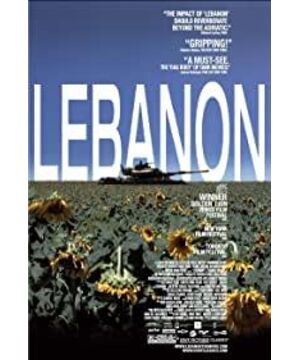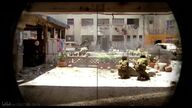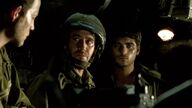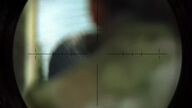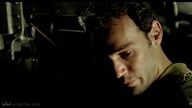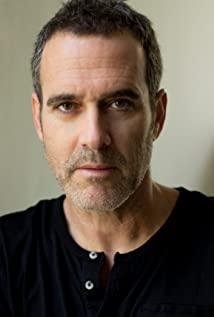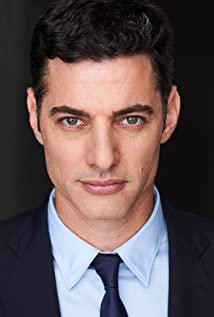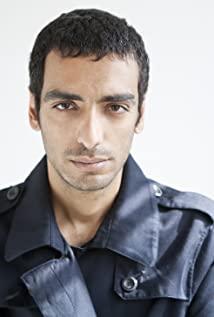I don’t know the directors and screenwriters who have made war-themed movies in the world. Several have participated in the war. If a person has participated in the war, the war movie he made may be completely different from "Lebanon", but it must be more like "Lebanon". Movies like Pearl Harbor are different. For Hollywood's commercial interests, the U.S. military will jointly create epic war epics out of image propaganda (for conscription), usually exaggerating heroism. Some other countries, for the purpose of enlightenment and propaganda, will create war films with the main theme that are far from personal feelings. "Lebanon" is naturally different from these. It is also different from anti-war films such as "Deer Hunter" and "Flags of the Fathers". It is very "small" and does not deliberately undertake some grand propositions.
A person's memory is the most real and the most subjective. When a person tells his memories, it cannot completely restore the truth of history. The degree of distortion depends on the honesty quality of the narrator. The director of "Lebanon" had personally participated in the war between Israel and Lebanon in 1982. The movie we saw was a purely personal war memoir, his fear, his murder, his pain, and his war. If we are willing to admit, this honest narrative represents a more general humanity.
In the film, there is nothing beyond the individual, and there is not much irony, humanity, or morality. Reproduce the feelings at the time, starting from a personal perspective, and discarding the usual outsider perspective. A person is in a tank, or is participating in a war, and he has no time to think about these metaphysical things. All he cares about is survival and death.
Most viewers have never experienced a battlefield. When watching a movie about war, they just imagined. Watching "Black Hawk Down" will be shocked and arouse blood; watching "Flags of Fathers" will arouse contemplation. No matter how much we empathize and how convincing our arguments are, we are still outsiders, using imagination or logic to perform virtual deductions. "Lebanon" is different. It has a stronger sense of substitution, but it is not passion, inspiration, absurdity, etc., but on-the-spot fear and pain. Of course, taking a step back, no matter how realistic "Lebanon" is, it is because the director was in it, and we are still on the outside.
Outsiders can carry the banner of anti-war like Michael Cimino, reflect on war like Clint Eastwood, director Samuel Maoz just reproduces his memory. A person tells his history of the war, and it is an unpleasant memory, which is naturally serious, and will not be ironic or frivolous. This is also in line with the plot of the film. Just imagine, a person in a tank will have time to engage in moral immorality, metaphysical speculation, or comedic exaggeration? The director is not the kind of person who has too much vanity and describes himself as a hero.
Of course, it is difficult for a film related to war to get rid of politics and standpoint. The director is Israeli, and the title of the film is "Lebanon", which in itself has a certain tendency. The film won the Golden Lion Award at the 2009 Venice Film Festival. The chairman of the jury Li Ang said: "I am very grateful to the director for examining the Lebanon war from the eyes of Israeli soldiers. This is not an easy task." I think the film is weakened to the greatest extent. The position issue, the only position is war. The cruelty of the war cannot eliminate the cause of the war, and "Lebanon" also did not show any extra ambition or leisure: to criticize someone. It is an anti-heroist war film, an anti-war war film, it is against the war itself, not a war against others.
The director honestly recounted his war memory, which contributed to the film's form and style. Starting from the memory, the director chooses the way of telling, and develops all the plots in a very small enclosed space such as a tank. Relative to the theme, the format of the film shows the greatest ambition. Most of them are close-up shots, and a few soldiers seem to be standing in front of the audience. Through the perspective of the muzzle scope, some highly stylized abstract images are brought to the film. However, it is conceivable that these images are "real" images. What the characters in the tank see are not these incomplete and swaying images. , The picture that is cast in color? Here, the film cleverly completes the combination of art and reality. The most realistic scene can also become a rather abstract stylized picture.
There is almost no soundtrack in the whole film, except for the minimalist soundtrack at the beginning and the occasional repetition on the way, these only "false sounds" have a quiet and shocking effect, like the dripping sound of fear and hope, slow, heavy, Can't get rid of. The rest are noises from the war scene, which are the voices that the director will never forget in his lifetime.
View more about Lebanon reviews


